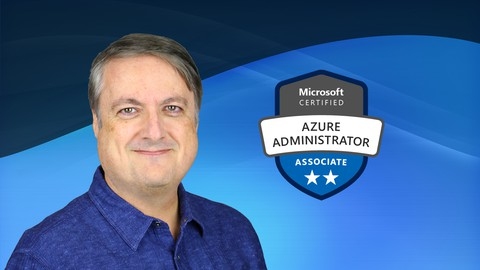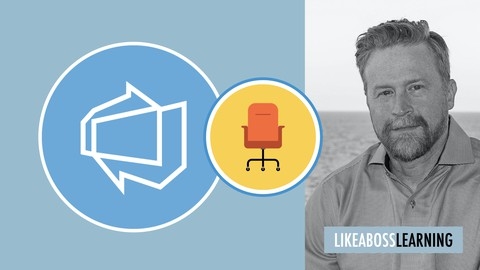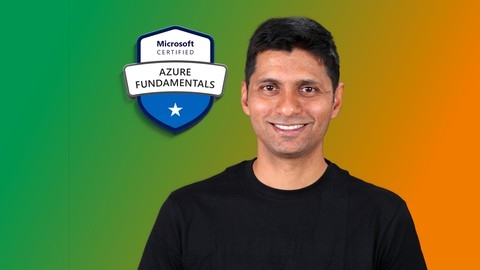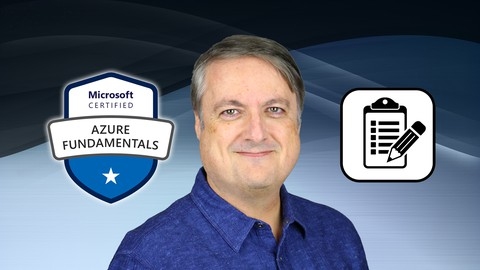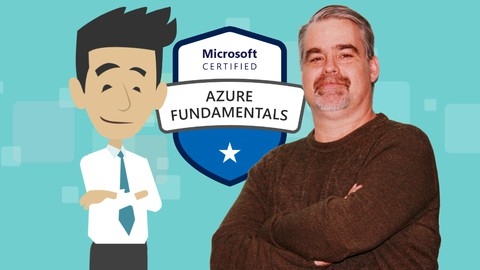Microsoft Azure is a cloud computing platform that provides a wide range of services, including compute, storage, networking, databases, and analytics.
Azure is a powerful tool for businesses of all sizes, enabling them to build and deploy applications quickly and securely.
Learning Azure can open up a world of opportunities, from becoming a cloud engineer to developing and deploying applications in the cloud.
Finding the right Azure course on Udemy can be a daunting task, with so many options available.
You’re looking for a comprehensive and engaging course that’s taught by experts and provides hands-on experience.
You also want a course that’s relevant to your specific needs, whether you’re a beginner, an experienced professional, or focused on a particular Azure certification.
For the best Azure course overall on Udemy, we recommend “AZ-900: Microsoft Azure Fundamentals Exam Prep - JAN 2024”.
This course is taught by Scott Duffy, a Microsoft Certified Trainer with a wealth of experience, and covers all the essential topics for the AZ-900 exam, which is a great starting point for anyone interested in Azure.
This course is highly rated and offers numerous practice questions and hands-on labs, making it a great choice for anyone looking to gain a solid foundation in Azure.
This is just one of many great Azure courses on Udemy.
Keep reading to discover more options, including courses tailored to specific Azure certifications, different skill levels, and areas of specialization.
AZ-900: Microsoft Azure Fundamentals Exam Prep - JAN 2024
Led by instructor Scott Duffy, this regularly updated course covers a wide range of topics essential for both non-technical and technical professionals.
You’ll start by diving into the fundamentals of cloud computing, exploring its benefits, such as high availability, scalability, elasticity, reliability, and enhanced security.
The course then delves into the different types of cloud services, including public, private, and hybrid cloud models, helping you understand the distinctions and choose the right fit for your needs.
One of the course’s strengths is its comprehensive coverage of Azure’s core architectural components.
You’ll learn about regions, availability zones, resource groups, subscriptions, and management groups, giving you a solid grasp of Azure’s infrastructure and how to organize and manage your resources effectively.
The course also provides an in-depth look at Azure’s compute and networking services.
You’ll explore virtual machines (VMs), VM scale sets for scaling compute resources, app services, containers, Azure Virtual Desktop, and Azure Functions.
Additionally, you’ll learn about Azure’s networking services, including VPN gateways, DNS, and public and private endpoints, ensuring you understand how to securely connect and manage your Azure resources.
Storage is another crucial aspect covered in the course.
You’ll learn about Azure’s storage offerings, such as Blob storage, Azure Files, and Azure File Sync.
The instructor even demonstrates how to create and manage storage accounts, upload files, and use tools like Azure Storage Explorer and AzCopy.
Security and identity management are critical components of any cloud solution, and this course doesn’t disappoint.
You’ll dive into Azure Active Directory (Azure AD), authentication and authorization concepts, conditional access, multi-factor authentication (MFA), passwordless authentication, and role-based access control (RBAC).
The course also covers the zero-trust security model and Microsoft Defender for Cloud, ensuring you understand how to secure your Azure resources.
Cost management is another essential topic covered in the course.
You’ll learn about factors that affect costs, how to use the Azure Pricing Calculator and Total Cost of Ownership Calculator, and explore Azure Cost Management and resource tagging strategies.
The course also covers governance and compliance features, such as Azure Blueprints, Azure Policy, resource locks, and Microsoft Purview, helping you ensure your Azure resources adhere to organizational policies and industry regulations.
To reinforce your learning, the course includes numerous live demos, quizzes, and a 50-question practice test, allowing you to apply your knowledge and gauge your exam readiness.
Additionally, you’ll have access to course resources, including a study guide, slides, and audio materials.
Microsoft Azure - Beginner’s Guide + AZ-900
The course starts with an introduction to cloud computing and Azure, guiding you through creating a free Azure account and navigating the portal.
You’ll learn about key terms and concepts essential for understanding Azure’s architecture and services.
One of the course’s strengths is its comprehensive coverage of Azure’s core services, including compute, networking, storage, and databases.
You’ll dive deep into deploying and managing virtual machines (VMs), both Windows and Linux, exploring features like availability sets, zones, and scaling options.
The course also covers Azure Web Apps, Functions, and Kubernetes for containerized applications.
Networking is a crucial aspect of cloud computing, and the course dedicates a section to Azure Virtual Networks, Network Security Groups, VPN connections, and Load Balancing.
You’ll learn how to secure your network and enable communication between resources.
Storage is another critical component, and the course covers Azure Storage Accounts, Blob storage, File shares, and data redundancy options.
You’ll also learn about Azure Data Box and Migrate for data transfer and migration.
Databases are essential for most applications, and the course introduces you to Azure SQL Database, Cosmos DB, and enterprise data warehousing solutions like Azure Synapse Analytics and Data Lake Storage Gen2.
Beyond the core services, the course touches on other important Azure offerings, such as Traffic Manager, Content Delivery Network, DevOps with Azure DevOps, Machine Learning, AI services, and IoT Hub.
Identity and access management are crucial for secure cloud deployments, and the course covers Microsoft Entra ID (formerly Azure Active Directory), Role-Based Access Control (RBAC), Multi-Factor Authentication, and Conditional Access Policies.
The course also delves into Azure management and governance, covering topics like cost management, budgeting, Service Level Agreements (SLAs), Azure Policy, Resource Manager templates, and monitoring with Azure Monitor and Log Analytics.
Throughout the course, you’ll have opportunities to apply your knowledge through hands-on labs, ensuring you gain practical experience with the concepts and services covered.
The syllabus concludes with a practice section, including practice tests to help you prepare for the AZ-900 exam, which validates your foundational knowledge of cloud services and Azure.
AZ-104 Microsoft Azure Administrator Exam Prep - OCT 2023
This comprehensive syllabus covers all the key topics you need to prepare for the Azure Administrator certification exam.
The course starts with an overview of Azure concepts, services, and resources like Virtual Machines (VMs), App Services, Storage, and Networking.
You’ll learn how to use PowerShell and the CLI to manage Azure, as well as how to work with Microsoft Entra ID (formerly Azure Active Directory) for user and group management.
A major focus is on role-based access control (RBAC) and governance, where you’ll dive into assigning roles, creating custom roles, applying policies, and using resource locks.
The syllabus also covers managing subscriptions, cost analysis, budgets, and resource tagging.
For storage, you’ll learn to configure access, redundancy, tiers, and data protection options like soft delete and versioning for Azure Blobs and Files.
The course guides you through deploying VMs, scaling with VM Scale Sets, and automating deployments using ARM templates and tools like Bicep and Terraform.
Networking is another key area, covering virtual networks, subnets, peering, gateways, DNS, network security groups (NSGs), and load balancing.
You’ll also explore monitoring with Azure Monitor, enabling diagnostics, and running queries.
The syllabus dives into backup and recovery solutions like Azure Backup and Azure Site Recovery for VM replication and failover.
Additionally, it covers modern app deployment with Azure Kubernetes Service (AKS), Azure Container Instances, and Azure Container Registry.
Hands-on labs are included throughout, allowing you to practice concepts like creating VMs, deploying ARM templates, configuring networking, and setting up load balancing.
The course wraps up with exam tips and a practice test to gauge your readiness.
Azure DevOps Fundamentals for Beginners
The course starts by introducing you to the world of DevOps and explaining why it’s important.
You’ll learn what Azure DevOps is and how to create a project within it.
The course then dives into Azure Boards, where you’ll define teams, work items, sprints, features, and epics.
You’ll explore different board views and learn how to use Azure Boards with GitHub.
Next up is Azure Repositories.
You’ll understand code management with Azure Repos, the difference between Git and GitHub, and how to create a code repository.
The course walks you through committing changes, performing pull requests, working with code locally, managing commit history, and cleaning up repos.
One of the core DevOps concepts is building and deploying code, which is covered in the Azure Pipelines section.
You’ll learn about DevOps pipelines, builds vs releases, and how to create build and release pipelines.
The course even troubleshoots a real-world pipeline deployment for a game called Flatris.
Testing is crucial in DevOps, so the course teaches you about test plans and different types of tests.
You’ll create a manual test plan and run a URL load test.
Towards the end, you’ll get hands-on experience creating a CI/CD training pipeline together.
The course wraps up by discussing next steps for your DevOps journey.
AZ-900 Microsoft Azure Fundamentals in a Weekend
The syllabus covers a wide range of topics, starting with an introduction to cloud computing and Azure.
You’ll learn about Azure’s global infrastructure, including regions and availability zones, which are crucial for building highly available and resilient applications.
The course dives deep into virtual machines (VMs), exploring their creation, configuration, and management.
You’ll also learn about scaling VMs using availability sets and virtual machine scale sets.
Moving on, you’ll explore Azure’s managed compute services, such as App Service for hosting web applications, Azure Functions for serverless computing, and Azure Kubernetes Service (AKS) for container orchestration.
The course covers Azure Storage services like Blob Storage, File Storage, and Azure File Sync, which are essential for storing and managing data in the cloud.
Databases are a critical component of most applications, and the course dedicates a section to exploring Azure’s relational and NoSQL database offerings, including Azure SQL Database, Azure Cosmos DB, and Azure Cache for Redis.
You’ll learn about database fundamentals, such as availability, durability, and data consistency, to help you make informed decisions when choosing a database solution.
Networking is another crucial aspect covered in the course.
You’ll learn about Azure Virtual Networks, subnets, network security groups, and Azure Firewall.
The course also covers hybrid cloud scenarios, where you can connect your on-premises infrastructure to Azure using VPNs or ExpressRoute.
Security and identity management are essential topics in the cloud, and the course covers Azure Active Directory (now Microsoft Entra ID) for identity and access management, as well as Azure Key Vault for securely storing and managing secrets.
You’ll also learn about role-based access control (RBAC) and conditional access policies.
The course explores Azure’s governance and compliance features, such as Azure Policy, Azure Blueprints, and Resource Locks, which help you maintain control and ensure compliance with industry standards and regulations.
Cost management is a critical aspect of cloud computing, and the course covers various cost models, including CapEx vs. OpEx, consumption-based pricing, and fixed-price models.
You’ll learn how to estimate costs using the Azure Pricing Calculator and analyze your spending with Azure Cost Management.
Finally, the course touches on DevOps practices in Azure, including continuous integration and continuous deployment (CI/CD) with Azure DevOps, infrastructure as code using ARM templates, and Azure Resource Manager.
AZ-900: Microsoft Azure Fundamentals Original Practice Tests
This course consists of three practice tests: Test A, Test B, and Test C. Each test is designed to help you prepare for the AZ-900 certification exam.
The practice tests cover a wide range of topics related to Microsoft Azure, including core Azure services, security, privacy, compliance, trust, pricing, and support.
By taking these tests, you’ll get a feel for the types of questions you can expect on the actual certification exam.
One of the key advantages of this course is that it provides you with a realistic testing environment.
The tests are timed, just like the real exam, so you can practice managing your time effectively.
Additionally, you’ll receive detailed explanations for each question, helping you understand the reasoning behind the correct answers.
Transitioning to the next point, the course offers a convenient online format, allowing you to access the practice tests from anywhere with an internet connection.
This flexibility makes it easier to fit your study sessions into your busy schedule.
AZ-900 Bootcamp: Microsoft Azure Fundamentals (FEB 2024)
The course starts with an introduction to the instructor and a pre-assessment to gauge your current knowledge level.
It then provides a wealth of complementary tools and learning aids, including a companion workbook, free access to hands-on lab simulations, an exam simulator, flashcards, and even a crossword puzzle to make learning fun.
The core content is divided into several chapters, covering essential Azure concepts and services.
You’ll learn about basic cloud computing concepts, such as the shared responsibility model, cloud models (public, private, and hybrid), and the benefits of cloud computing.
The course then dives into different cloud service types, including Infrastructure-as-a-Service (IaaS), Platform-as-a-Service (PaaS), and Software-as-a-Service (SaaS).
You’ll gain a solid understanding of Azure’s core architectural components, such as regions, availability zones, resource groups, and subscriptions.
The course also covers Azure’s compute services, including virtual machines, VM scale sets, app services, and Azure Functions.
Additionally, you’ll explore serverless computing, containers, and Kubernetes.
Network services are a crucial aspect of Azure, and the course provides in-depth coverage of virtual networks, DNS, VPN gateways, ExpressRoute, and private links.
Storage services, such as Blob storage, Azure Files, and managed disks, are also covered in detail.
The course dedicates a significant portion to identity, access, and security in Azure.
You’ll learn about Azure Active Directory (Entra ID), multi-factor authentication (MFA), role-based access control (RBAC), and the zero-trust methodology.
Additionally, you’ll explore governance, compliance, and cost management strategies in Azure.
Throughout the course, you’ll have opportunities to reinforce your learning through quizzes, hands-on labs, and demos.
The instructor also provides additional resources, such as recommended reading and optional tech talks, to further enhance your understanding.
AZ-303 Azure Architecture Technologies Exam Prep
The course starts with an overview of cloud computing concepts and Azure’s services, ensuring you have a solid foundation.
You’ll learn how to analyze resource utilization and consumption by configuring diagnostic settings, creating baselines, testing alerts and metrics, and managing Azure costs effectively.
The course dives deep into implementing virtual machines (VMs) for Windows and Linux, covering everything from creating VMs to resizing, adding data disks, and implementing availability sets and zones.
Automation is a key focus area, with lessons on using PowerShell’s Azure Az module, deploying ARM templates, and leveraging Azure Automation accounts.
You’ll also learn to implement storage accounts, configure access keys, explore storage explorer, and implement redundancy options.
The syllabus covers virtual networking extensively, including deploying VNETs using ARM templates, establishing VNET-to-VNET connections, and implementing VNET peering.
You’ll gain insights into monitoring cloud infrastructure with Azure Security Center, Azure Advisor, Log Analytics workspaces, and Kusto log queries.
Azure Active Directory (AAD) is another crucial topic, covering tenant creation, custom domain assignment, sign-in policies, identity protection, self-service password reset, conditional access, and multi-factor authentication (MFA).
The course also delves into managing hybrid identities with Azure AD Connect and AAD Connect Health.
If you’re planning to migrate workloads to Azure, you’ll learn about Azure Migrate, performing migration assessments, backing up Azure VMs, and update management.
Load balancing and network security are covered in-depth, with lessons on implementing load balancers, application gateways, firewalls, Azure FrontDoor, and Azure Traffic Manager.
Governance solutions are a key focus area, with lessons on Role-Based Access Control (RBAC), Azure Policy, and Azure Blueprints.
You’ll also learn to manage security for applications using Azure Key Vault, managed identities, and registering applications with Azure AD.
The course covers implementing application infrastructure with Web Apps, App Service Plans, Logic Apps, and Function Apps.
Container-based applications are also explored, with lessons on Docker, Azure Container Registry, Azure Container Instances, and Azure Kubernetes Service (AKS).
NoSQL databases like CosmosDB and Azure SQL databases are covered, ensuring you understand data storage options in Azure.
The course also provides insights into cloud design patterns and the Azure Architecture Center.
Throughout the course, you’ll have access to hands-on labs, practice quizzes, and study guides to reinforce your learning and prepare for the AZ-303 exam effectively.
AZ-204 Developing Solutions for Microsoft Azure - OCT 2023
The syllabus covers a wide range of Azure services and concepts that are essential for developing solutions on the Azure cloud platform.
There’s a special focus on preparing you for the AZ-204 certification exam
You’ll start with an overview of the exam requirements and get familiar with the Azure portal and Cloud Shell.
One of the key topics is Azure Virtual Machines (VMs), where you’ll learn about creating, configuring, and managing VMs using the Azure portal, PowerShell, and CLI.
While VMs are no longer part of the exam, understanding them is still valuable for Azure developers.
The course then dives into Azure App Service, which is a Platform-as-a-Service (PaaS) offering for hosting web applications.
You’ll learn about deploying apps, scaling, and configuring settings like SSL and autoscaling.
Containers are also covered, with lessons on Azure Container Instances (ACI), Docker Desktop, and deploying container apps from Azure Container Registry.
Additionally, you’ll explore Azure Function Apps, including creating functions, monitoring, and using durable functions.
Storage is a crucial aspect of Azure solutions, and the course dedicates a chapter to Azure Storage Accounts.
You’ll learn about configuring storage accounts, encryption, uploading files, and using tools like AzCopy V10.
Another important topic is Azure Cosmos DB, a globally distributed, multi-model database service.
The course covers creating Cosmos DB accounts, managing data, and setting consistency options.
Authentication and authorization are essential for secure Azure solutions, and the course covers Entra ID (Azure Active Directory), registering applications, and using the Microsoft Graph API.
Data encryption is also covered, with lessons on securing app configurations, encrypting data in storage accounts and SQL databases, and using Azure Key Vault for customer-managed keys (CMK).
Caching and Content Delivery Networks (CDNs) are discussed, including Azure Cache for Redis and implementing caching patterns.
You’ll also learn about creating and using CDN profiles.
The course covers monitoring and troubleshooting with Application Insights, as well as logging for VMs and Function Apps using Azure Monitor.
Consuming Azure services is another important aspect, with lessons on API Management, configuring APIs, and using Swagger/OpenAPI.
Event-based solutions are covered, including Azure Event Grid and Event Hubs.
Application messaging with Azure Storage Queues and Service Bus Queues is also included.
The course provides code samples for various topics, such as Azure Blobs, Cosmos DB Todo App, Azure Active Directory, and Azure Key Vault, which can be helpful for hands-on learning.
AZ-104 Microsoft Azure Administrator Certification
This course focuses on preparing you for the AZ-104 Microsoft Azure Administrator Associate certification exam.
You’ll start by learning how to create an Azure free account and navigate the Azure portal.
The course then dives into deploying and managing Azure compute resources like virtual machines (Windows and Linux), web apps, containers, and Kubernetes clusters.
You’ll learn to configure networking components such as virtual networks, subnets, network security groups, load balancers, and application gateways.
Storage is a crucial aspect covered, including blob storage, file shares, access tiers, replication, and securing storage accounts.
The course teaches you to implement Azure Active Directory for identity and access management using role-based access control (RBAC), multi-factor authentication (MFA), and conditional access policies.
Monitoring Azure resources is essential, and you’ll learn to use Azure Monitor for alerts, log analytics workspaces, and custom logging.
Backup and disaster recovery solutions like Azure Backup and Azure Site Recovery are also covered.
The course equips you with skills to automate deployments using PowerShell, Azure CLI, ARM templates, and the Bicep language.
You’ll practice creating resources like virtual networks, storage accounts, and virtual machines through code.
Hands-on labs reinforce concepts like configuring virtual machine disks, availability sets, scale sets, custom script extensions, and network watcher.
You’ll also learn to secure resources using Azure Firewall, private endpoints, and virtual network peering.
Also check our posts on:



